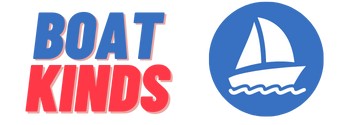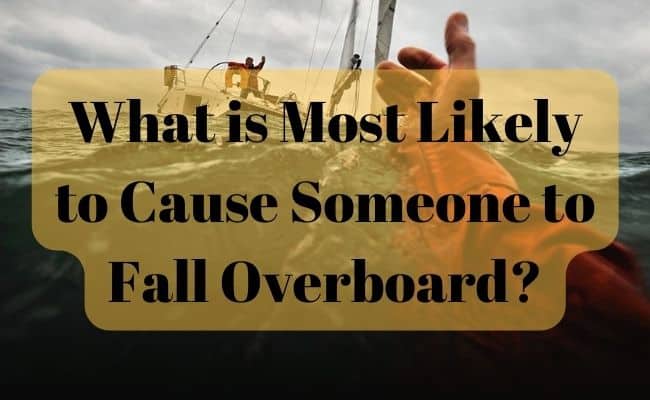One most likely cause fall overboard is standing up in the boat. This is particularly dangerous if the surface is wet or slick. If you are standing up in a boat, you should take care to hold onto a safety rail.
Falling overboard on a boat is a dangerous situation. While the chances of injury are high, there are also ways to mitigate the risk. Common causes of falling overboard include being near the edge of the boat, a lack of experience, alcohol, or being overexcited. It’s important to stay seated at all times and avoid risky behaviors.
Drinking alcohol is also a risk factor. Alcohol impairs fine motor functions and reduces vision, making it difficult to remain above the water’s surface. Also, alcohol lowers the body’s core temperature. If someone falls overboard while drinking alcohol, they could drown and become hypothermic.
Why Would Someone Stand When the Boat is Moving?
It makes no sense to stand when the boat is moving. Standing while the boat is moving causes your body to move in a direction contrary to what you feel. To avoid this, stay on the deck. Moreover, avoid drinking coffee, alcohol, and spicy food.
There are a variety of reasons for standing while in a boat. First, standing forces the body to shift its center of gravity. Usually, this effect dissipates within minutes or hours, but sometimes it can last for months, or even years. For this reason, it is essential to avoid standing on the leeward side of the boat.
What to do Immediately When Someone Falls Overboard?
If you’re on a boat and someone falls overboard, your first response should be to shout, “MAN OVERBOARD!” while keeping your eyes on the victim. If you can, try to signal other boats nearby. If no one else hears you, try to get the victim back on board.
Avoid Entering The Water to Rescue a Victim
If someone falls overboard, do not immediately enter the water to help them. Even if you are a strong swimmer, you can endanger yourself and the victim by accidentally dragging them under. Instead, use a life jacket and a flotation device to put yourself between the victim and the water.
Cut off The Engine
If you notice a person who has fallen overboard, cut the engine immediately and try to reach him. If possible, use a PFD or horse buoy to pull him up. If you are unable to reach him, you should give him a flotation device. Having a buoyant object near you will minimize his panic and help you reach him.
You should not try to swim to the victim unless you are sure you can swim to him or her. This is especially important if you are in an area where swimming is permitted. If you can swim to the person in the water, the waves will bring him closer to you.
However, be careful when doing this, as the victim could fall under the boat and be hit by the boat. Once you reach him, aid him with the boarding ladder and aid. You may need help from others to help him.
Alert Other Boats
If someone falls overboard, the first step in saving the person is to raise the alarm and alert other boats. You can do this by shouting “man overboard!” or by contacting any crew member. You should note where the person fell overboard so the other boaters can quickly respond to the distress call.
If you can’t see the person in the water, try a life ring made of highly visible smoke. The smoke will alert the other boats. The smoke will drift in the water at the same rate as the person. A whistle blast is also a good way to alert other boats. You should be able to hear the sound of the whistle, even if you aren’t near the person.
Get The Victim Back Aboard
If someone falls overboard on your boat, there are several things that you can do to help get them back on board. First, make sure that your boat has a high enough freeboard that you can safely reach the victim. If you’re not able to, you can secure a tarp or a net to the gunwale and use it to hold the victim while you get help.
The victim’s condition should be carefully assessed before you can attempt a rescue. A victim’s swimming ability may be impaired or their arms may not be strong enough to assist them in getting back aboard.
Additionally, hypothermia is a serious issue that may require the assistance of a medical professional. You should also slow down the boat if visibility is poor. This is especially important if you’re approaching a fog bank or squall.
What Should I do if I Fall Overboard?
If you cause fall overboard, the first thing to do is to try to climb back onto the boat. You can also try to grab hold of something floating on the water. However, you need to be aware that distances on the water can be deceptive. If you cannot climb back onto the boat, you should wait for rescue until you can reach the shore.
It is very important to be rescued as quickly as possible. The longer you remain in the water, the more likely you are to face dangers like hypothermia or even drowning. A fall into the water can cause bone fractures, spinal injuries, or even brain injuries. If the boat runs aground, these risks are even greater.
The most important thing to do if you fall overboard is to wear a PFD, which can provide you with additional time to get rescued. Many people have the misconception that if they fall in the water without flotation, they will die from hypothermia. This is incorrect. Hypothermia is a condition in which the body’s temperature falls below 95 degrees Fahrenheit. To prevent hypothermia, stay calm and don’t move if you feel cold.
If you cause fall overboard while on a cruise ship, raise an emergency alarm and wait for rescue personnel to come to your rescue. If the ship is large and cannot make a U-turn in time to save you, a small manned boat can be used to help you. If you can stay calm, you have a better chance of surviving.
Precautions to Avoid Falling Overboard
Falling overboard is an extremely scary situation, but there are many precautions you can take to avoid it. For example, you should use a life jacket and safety harness whenever you’re on the water. Moreover, you should not stand on a moving boat, especially during bad weather.
Safety Harness
A safety harness can be life-saving equipment. This harness features soft 2-inch “W” webbing, double D-rings, and a central acetal resin buckle. It also includes a SOLAS-grade whistle and lanyard. Some models have an additional elastic pouch for a personal strobe light, flares, or knife. The straps are bright safety yellow.
A safety harness helps prevent falling overboard while working on the deck. When working on a boat, it is critical to stay close to the helm. Working on deck can be hazardous even in good weather, and slipping on ice, algae, or other hazards can cause a boat to pitch unexpectedly. A safety harness is also a necessity for the crew working on the deck, especially in bad weather.
In severe weather, a double harness will help prevent falling overboard. This safety device is more effective than a life jacket alone, as guardrails cannot be fastened securely in heavy weather. Permanent lifelines can be clipped to the harness and can also be attached to a life jacket. A combination of harness and life jacket is an even better choice.
Avoiding Standing on a Moving Boat During Bad Weather
The most basic safety rule is to never stand on a moving boat. This can lead to cause fall overboard. The best way to prevent falling overboard is to always use one hand to hold onto the boat and keep it afloat. Also, don’t wear heavy clothing that might make it difficult to stay above water. It is also important to remove shoes, which can act as flotation devices.
People who stand near the edge of a moving boat are at the highest risk of cause fall overboard, especially in rough conditions. The sudden movements and constant shaking of the boat can cause anyone to slip overboard. Many boats that carry passengers will advise passengers to remain seated when the weather is bad. They should also keep at least one hand on the railings at all times.

